PBS: Escaping Eritrea … [Read More...] about ካብ ውሽጢ ቤት ማእሰርታት ኤርትራ
A Revolution Devours Its Children
Lauren Bohn | 23
Five years since an uprising brought down Egypt’s dictator, five families show the country’s struggle is as much personal as it is collective.
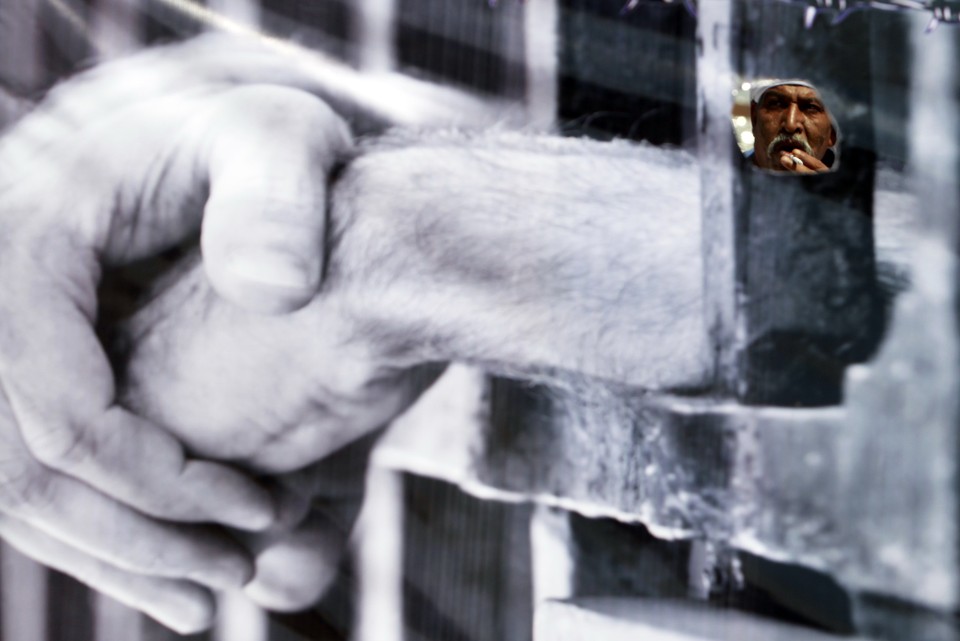
CAIRO—It takes about 30 minutes to drive from the teeming Cairo neighborhood of Faisal to what locals call “El Sijn”—Arabic for “the prison.” There are many in Egypt, but everyone seems to know the prison: Tora Prison, opened in 1908. It has housed a diverse assortment of the country’s dissidents, businessmen, Islamists, and statesmen—including the ousted president Hosni Mubarak, who had ruled Egypt for nearly three decades before his regime fell in the uprising that began almost exactly five years ago.
Since then, the upheaval hasn’t stopped, and it’s as much personal as it is collective. The country saw its first-ever democratic elections; another wave of protest over the rule of Mohammed Morsi, the Islamist president those elections brought to power; a military coup, led by then-Army Chief Abdel Fattah el-Sisi; and a reinstatement, under now-President Sisi, of the kind of authoritarianism protesters risked their lives to escape five years ago. The crackdown has ensnared liberals and Islamists alike, leaving the prison as a burial chamber for the aspirations of the revolution, in all their wide variety.
“It’s been five years since we’ve toppled Mubarak and we’re back to square one,” Nourhan says. At 26, Ahmed was one of Egypt’s most prominent liberal activists, and remains a living symbol of the revolution: once vibrant and triumphant on Cairo’s streets, now languid and silenced behind bars. The young couple used to talk for hours about their plans to open a bookstore, maybe even start a publishing house dedicated to fostering freedom and democracy in a country with a severe deficit of both. Now their conversations are limited to a hurried, supervised 20 minutes every other week.
“It is worse than square one.”
***
Prisoner: Ahmed Douma
Nourhan Hefzy (wife) and Fathia Douma (mother)
It took awhile for Fathia to warm up to Nourhan, the wife of her oldest son. For one thing, she’s unveiled. Fathia, who has lived in a conservative Nile Delta village her whole life, says she was worried what other people would say. “In our family we would consider a man who lets his woman dress like this as not in control of his house,” she explains.
Nourhan is also a self-described liberal activist who, despite growing up in a conservative Cairo neighborhood, was allowed to have boys as friends and pursue drama in school. Fathia comes from a family of staunch Muslim Brotherhood supporters in the countryside. In communities like theirs, long neglected by Mubarak’s regime, the Muslim Brotherhood provided a range of social services such as health clinics and nursery schools. Fathia’s family benefitted from and strengthened that network; they built their neighborhood’s first mosque and volunteered weekly. For Fathia and her husband, the organization “signifies what it means to be a Muslim. It’s about caring for all.” Nourhan rolls her eyes at this.
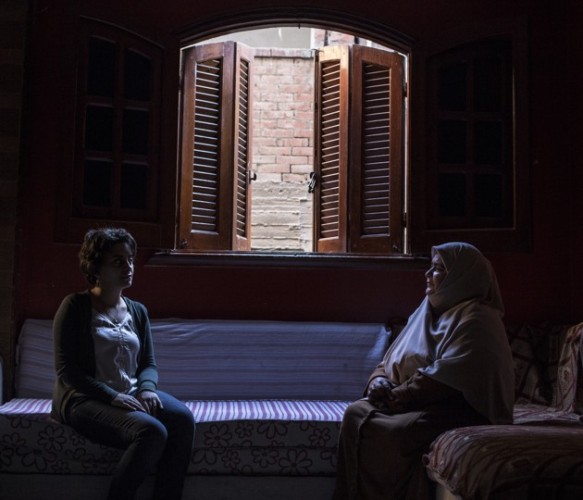
Fathia notes generational differences—“this generation wants to live their life, in their own style”— but there’s more to the family’s dispute. Ahmed, she says, has always questioned authority. In February 2015, he was sentenced to life in prison as part of Sisi’s crackdown. But by then he was no stranger to prison. He had been jailed under Mubarak and then Morsi as well. He was first arrested in 2009 at the border of the Gaza Strip along with other activists expressing solidarity with Palestinians.
“This generation wants to live in their own style.”
***
Hana (mother), Doaa (sister)
Esraa el-Taweel returns to her cramped Cairo apartment for the first time after six months in prison. It’s largely as she left it, filled with the traces of a normal 23-year-old life turned upside down in just one evening.
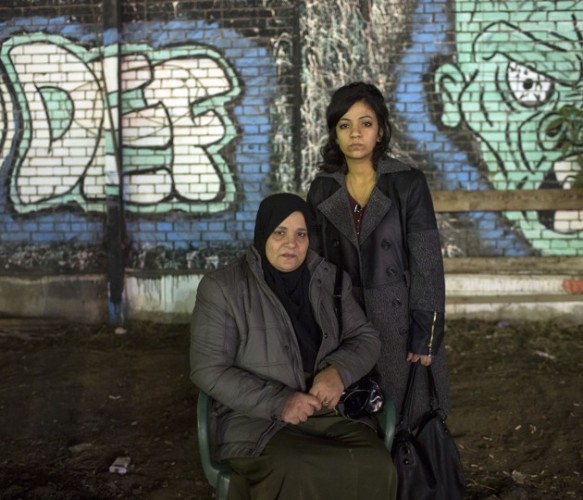
“Esraa never cost Egypt anything. Yet Egypt took the most valuable thing from her: her freedom.”
“The days were long and we all had nightmares. Is she alive? Did someone kill her?” recalled Doaa. “We waited 17 days until we found out she was detained.”
It wasn’t until Esraa’s father went on television to talk about his missing girl that someone gave the family a tip through Facebook: A woman said she had seen Esraa at a prison for women in Cairo. Like many Egyptian young people, Esraa had protested against Sisi’s human-rights abuses and tweeted criticisms of his rule, Doaa says—nothing that warranted detainment. “If a nearly crippled girl is a threat, then it can be any of us.”
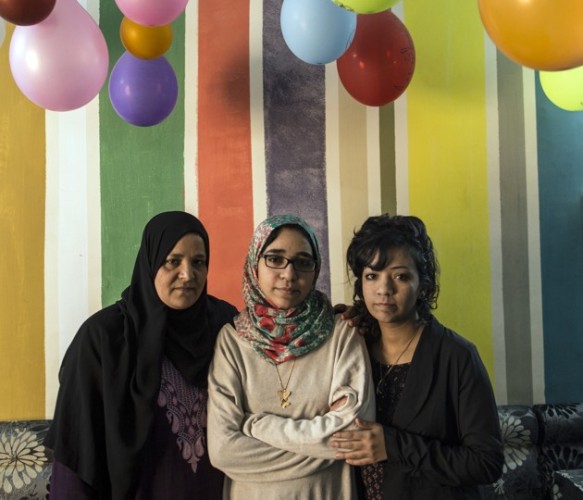
***
Prisoner: Mohammed Emam
Saleh Taher (mother)
Saleh Taher grew up in the backstreets of Awayed, a poor neighborhood on the edge of Alexandria, never really understanding politics. A member of “Hezb al-Kanaba,” the couch party—a term for Egypt’s silent majority that sat out the revolution at home— Saleh says she has never really even watched the news. In her version of Egypt, 2011 was just another year.
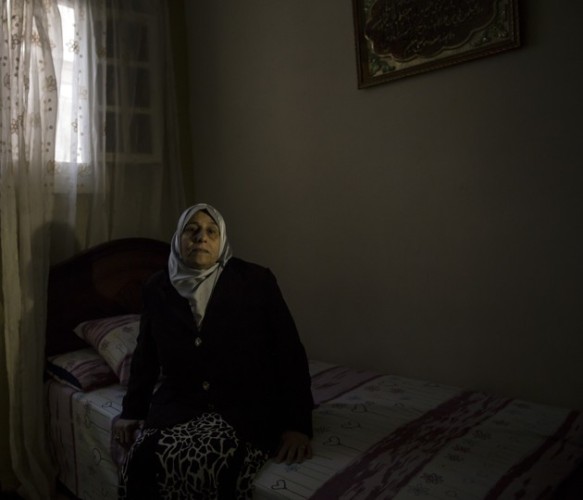
“We’re not a politically interested family,” she explains as we sit in her living room with her husband and oldest son. “We don’t like politics.”
But now they’re tangled in and strangled by it.
In January 2014, Saleh’s 21-year-old son Mohammed Emam was shot in the leg during a demonstration at the University of Alexandria. That April, he was arrested following a protest at the university.
While his mother denies that her son is an activist, his friends say Mohammed is part of the April 6 Youth Movement—a group that helped organize the mass protests that toppled Mubarak in February 2011. In April 2014, a court banned the movement, accusing it of “espionage” and “activities that distort Egypt’s image.” One pro-government lawyer accused the group of being a “terrorism organization.”
“We don’t even know what April 6 is,” Saleh says. She often mistakes the name and confuses the group’s prominent leaders—evidence, she says, of her family’s ignorance and her son’s innocence.
“We don’t like politics.”
***
Prisoner: Loay el-Khawagy
Mai el-Khawagy (sister)
Mai says she has aged 50 years in the past five. When the revolution started, the aspiring violinist was only 15. She didn’t know what was happening or what was at stake. She had grown up in Alexandria and had never been to Cairo. She still hasn’t. But now at 20, she says she has seen it all.
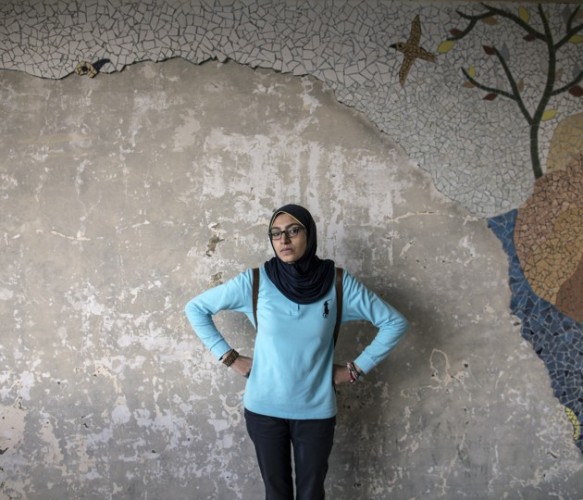
“I’m not a child anymore,” she declares, sitting in a café on Alexandria’s glistening Mediterranean coastline. “No one is a child anymore.”
Along with her childhood, she has lost friends over political differences. She has lost others through death. She witnessed the killings of two friends, who were met with live ammunition at her university where they were protesting for more rights.
She’s also lost her sense of place. To see her 28-year-old older brother, Loay, she must now wake up at dawn and travel to Alexandria’s Borg El Arab prison, where he’s been serving a two-year sentence. She waits for up to five hours in “disgusting conditions” to see him for a rushed 20 minutes.
“Loay says the situation is so bad now in Egypt that being in prison is actually better, because if he were out, he would do something reckless or radical,” she says. “He would keep protesting and never go back until he’s dead.”
In February 2015, Loay and others were sentenced to two years in prison, for charges including protesting without authorization and threatening public security. After an appeal, the verdict was reduced in May to one year and three months. Loay was already in prison, serving time in another case of protesting without permission outside the Alexandria Criminal Court in December 2013, while it was retrying two police officers accused of killing 18-year-old Khaled Said. Said died in June 2010 after being beaten by police officers. His death is considered a major catalyst for the 2011 revolution.
“He says the situation in Egypt is so bad now that being in prison is actually better.”
***
Rawda (daughter)For the past six months, whenever Rawda has wanted to see or talk to her father, she must wait for a call from an unknown number. She then travels from her Nile Delta village to a clandestine location around Cairo, where he changes his residence once every few weeks.
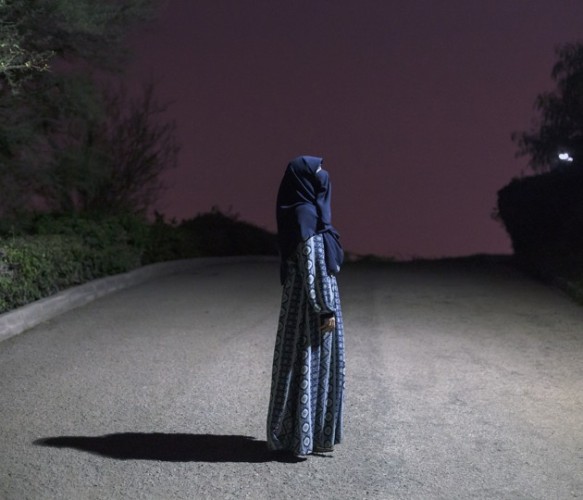
In October 2013, he was arrested for being a member of the Brotherhood. After two and half years behind bars, he was released. But his freedom was short-lived. He soon heard there was another order for his arrest. He hit the road immediately.
“If everyone fled, who would stay and fight?”
“I felt that he wasn’t fulfilling his promises to the revolution,” she explains. “Everyone makes mistakes like any other group, and I wanted more room to criticize him.”
But in 2013, her lukewarm allegiance boiled to impassioned dedication when security forces killed up to 1,000 supporters of the ousted Islamist president in Midan Rabaa al-Adawiyya, a public square in eastern Cairo, who had been occupying the square for 47 days. Human Rights Watch has described the event as “one of the world’s largest killings of demonstrators in a single day in recent history.”
Rawda lost a cousin and many friends.
“There’s been a blood ghost following me ever since,” she says, barely able to finish her sentence. “I can’t shake the sights of that day.” She has been in therapy for the past few years but still suffers from panic attacks whenever she is near the square.
While Rawda says the Muslim Brotherhood has moved back underground, they’re as committed as ever. They hold their weekly meetings in secret locations and have appointed a new local leadership. Still, everyone knows she is associated with the group, and she fears she could be expelled from her university at any time. Every two weeks she and her friends hold small demonstrations there, but they feel powerless to effect any real change.
“In some ways, everything but nothing has changed,” she says. Nine months ago, she decided to wear the niqab, a veil that covers the face. Her father advised her not to—for fear of rising national sentiment against Islamists—but she insisted.
“It’s my way of saying I’m going to be who I want to be,” she says. “It’s my choice. It’s my right.” She also expresses herself on Facebook, posting a torrent of pleas for people to remember the jailed and detained, for the country to “wake up.” Recently, she posted an image of a ballerina’s feet, the left one wrapped in an elegant slipper, the right one bare but for bandages, bruises, and sores. It’s a reminder, Rawda says, of the beauty that masks pain, of the pain that creates beauty.
She now wants to be a human-rights lawyer and has started working with the London-based Arab Organization for Human Rights. She documents arrests and contacts families of detainees.
“When Mubarak stepped down, it was a beautiful memory,” she says, recalling protesting in Tahrir Square alongside her father. “Now, all we have are the memories.”
